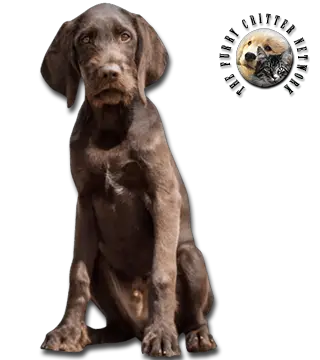Breed Standard
Head: Medium in length, broad, with bristly hair (beard and bushy eyebrows). Abrupt stop creates a slightly dish-faced appearance. Curved nosebridge like that of the English Pointer. Broad, long muzzle.
Ears: Medium in length, more pointed than rounded, well-furnished with hair, hanging very flat against the cheeks.
Eyes: Large, round, yellow to yellowish-brown.
Body: Fairly solid. Neck medium in length, cleanly cut, arched, muscular. High, long withers. Chest moderately broad, very deep. Well-arched ribs. Very muscular loin. Tuck-up. Short flanks. Short, straight back. Long, well-muscled, moderately sloping croup.
Tail: Lightweight, very straight, with hard hair. Docked.
Hair: Hard, medium in length, harsh, and dense. Short on the lower legs.
Coat: Dead foliage or brown. White, black, too pale, or bridled markings are not allowed.
Size: 60 to 65 cm (23.5-25.5 in).
Weight: 25 to 30 kg (55-66 lb).
History
In 1881, a German breeder, Baron von Zedlitz, worked on producing his ideal tracking, pointing, and retrieving gun dog, suitable for work on both land and water. From seven specific Poodles and nearly 100 different pointers, he developed the Pudelpointer. The original sire was Tell, an English Pointer belonging to Kaiser Frederick III and the original dam was a German hunting pudel named Molly who was owned by Hegewald, an author known for works on hunting dogs.
The goal was to produce a dog that was willing and easy to train, intelligent, and loved water and retrieving, like the poodle, and add to that a great desire to hunt, a strong pointing instinct, and an excellent nose, like in the English Pointer, as well as being an excellent companion in the home.
The Poodle breed had much stronger genes, and so many more Pointers were used to achieve the balanced hunting dog that was desired. A mix of 11 Pudels and 80 Pointers were used during the first 30 years to achieve the desired traits and results.
The breed was introduced to North America in 1956 by Bodo Winterhelt, who remained involved in maintaining the breed standard until his death in 2018. His Winterhelle Kennel was the foundation of the breed in North America. In 1977 Winterhelt founded the Pudelpointer Club of North America in Canada.
In Germany as well as North America, its performance standards are its most important trait. Before being approved for breeding, dogs and bitches must pass Hunt Test with minimum scores of their performance tests of its field, tracking, and water skills set by the various breed clubs. These clubs are the Verein Pudelpointer in Germany and the following clubs in North America: NAPPA, PCNA and VPP-GNA. The North American Versatile Hunting Dog Association (NAVHDA) also tests pudelpointers and other breeds of versatile hunting dogs.
The pudelpointer never became a popularized breed in the United States in part because breeders have actively avoided recognition by the American Kennel Club. Breeders believe that AKC recognition would place too much emphasis on form over function, possibly splitting the breed into a show breed and separate working class.
Behavior
The energetic Pudelpointer can hunt on all types of terrain (fields, woods, and swampland). From the English Pointer he inherited his keen nose, spiritedness, and speed; from the Poodle he got his cleverness and love of water. He tracks energetically and is a very good retriever. He is good-natured and needs firm training.
He needs space and exercise, as well as regular brushing and attention to the ears.
Function
Hunting Dog, Pet.






